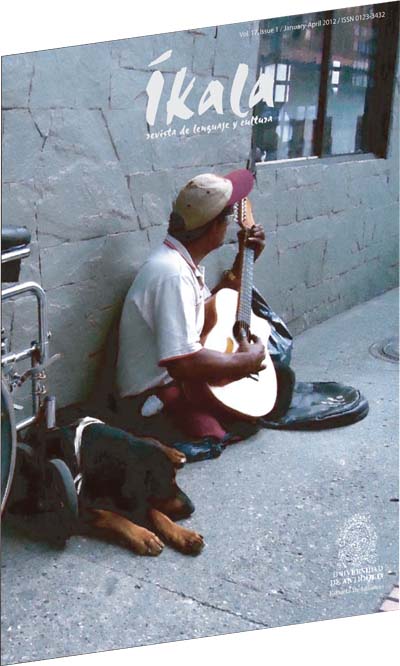The Linguistic Policy of Certification of Foreign Language Competence at the Universidad de Antioquia: a Discourse Based Analysis
DOI:
https://doi.org/10.17533/udea.ikala.8016Keywords:
linguistic policy, certification, foreign language competence, critical discourse analysis, naturalizationAbstract
This article examines some discourses about the Linguistic Policy of the Certification of Foreign Language Competence (LP of CFLC) at the Universidad de Antioquia, with the aim of analyzing the findings, perceptions and positions of those who administer the policy regarding what it establishes and means. The article presents a methodological approximation based on a critical discourse analysis to tackle the subject. The analysis is done through some excerpts taken from the corpus of the study, which are constituted by: 1) Thirty semi-structured interviews applied to the board of professors that run the policy, postgraduate students, professionals and educators that have met the requirement of certification; and 2) the official documents that support the policy. The analysis makes it possible to identify the administrator's reflections on the LP of the CFLC. In addition, it unveils how through this type of discourse the certification requirement of foreign language competence has been naturalized and legitimized and how such a requirement serves as a mechanism for the compliance of the policy, acquiring a leading role. This requirement generates resistance against the linguistic policy, and not so much the assumed importance of the foreign language competence acquisition.
Downloads
References
Bergenholtz, H., & Tarp, S. (2004). Política lingüística: conceptos y definiciones. Recuperado de http://www.cttic.org/ACTI/2004/papers/Henning_Bergenholtz_y_Sven_Tarp_Politicalinguistica.pdf
Escuela de Idiomas. (2010). Balance social 2010. Recuperado de http://www.udea.edu.co/portal/page/portal/SedesDependencias/Idiomas/B.InformacionEscuela/Balancesocial
Consejo Académico de la Universidad de Antioquia. (1997). Acuerdo académico 0114 2 de septiembre de 1997. Recuperado de http://ingenieria.udea.edu.co/vicedecanatura/competencia_lectora/aa_competencialectora_pregrado.htm
Consejo Académico de la Universidad de Antioquia. (2008). Acuerdo académico 334 20 de noviembre de 2008. Recuperado de http://secretariageneral.udea.edu.co/doc/u0334-2008.rtf
Fairclough, N. (Navarro, F.,Trad.) (1995). General introduction . En Critical discourse analysis. The critical study of language (pp. 1-20). Londres, Inglaterra; Nueva York, Estados Unidos: Longman.
Fairclough, N. (2001). Language and power (2nd edition). Edimburgo, Escocia : Pearson Education Limited.
Fairclough, N. (2003). Analysing discourse. Textual analysis for social research. Nueva York, Estados Unidos: Routledge.
Fairclough, N. (2008). El análisis crítico del discurso y la mercantilización del discurso público: Las universidades. Discurso y sociedad, 2(1), 170-185.
Halliday, M. (1978). Language as social semiotic. The sociosemantic nature of discourse. Londres, Inglaterra: Edward Arnold.
Pennycook, A. (2001). A critical applied linguistics: Critical introduction. Sídney, Australia: Lawrence Erlbaum Assosiates, Inc.
Shohamy, E. (2006). Language policy: Hidden agendas and new approaches. Londres, Inglaterra; Nueva York, Estados Unidos: Routledge.
Wodak, R. (2001). Aspects of critical discourse analysis. En M., Meyer, & R., Wodak (Eds). Methods of critical discourse analysis. (pp. 6-31). Los Ángeles, Estados Unidos: Sage.
Published
How to Cite
Issue
Section
License
Copyright (c) 2012 Íkala, Revista de Lenguaje y Cultura

This work is licensed under a Creative Commons Attribution-NonCommercial-ShareAlike 4.0 International License.












